| Listing 1 - 10 of 25 | << page >> |
Sort by
|
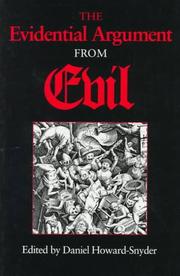
ISBN: 0585109214 9780585109213 9780253114099 0253114098 0253329655 0253210283 9780253329653 9780253210289 Year: 1996 Publisher: Bloomington : Indiana University Press,
Abstract | Keywords | Export | Availability | Bookmark
 Loading...
Loading...Choose an application
- Reference Manager
- EndNote
- RefWorks (Direct export to RefWorks)
Theodicy. --- Evil, Problem of (Theology) --- God --- Permissive will of God --- Problem of evil (Theology) --- Good and evil --- Permissive will --- Will, Permissive
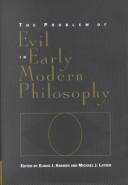
ISBN: 1282014552 9786612014550 1442682140 9781442682146 9781282014558 0802035523 9780802035523 Year: 2001 Publisher: Toronto, [Ontario] ; Buffalo, [New York] ; London, [England] : University of Toronto Press,
Abstract | Keywords | Export | Availability | Bookmark
 Loading...
Loading...Choose an application
- Reference Manager
- EndNote
- RefWorks (Direct export to RefWorks)
The papers in this collection represent some of the best original work being done today on the theodicies of such early modern philosophers as Leibniz, Suarez, Spinoza, Malebranche, and Pierre Bayle.
Good and evil --- Theodicy --- Evil, Problem of (Theology) --- God --- Permissive will of God --- Problem of evil (Theology) --- History of doctrines --- Permissive will --- Will, Permissive --- Toronto <1999>
Book
ISBN: 1621896196 9781621896197 9781620320396 1620320398 Year: 2013 Publisher: Eugene, Oregon : CASCADE Books,
Abstract | Keywords | Export | Availability | Bookmark
 Loading...
Loading...Choose an application
- Reference Manager
- EndNote
- RefWorks (Direct export to RefWorks)
What is God doing about a world marked by conflict and division? What about a world in which our technologies promise great good but also threaten our existence? What is God doing in a world where the demands for accumulation and acquisition create division and despair? Can Christians hope to be of positive influence in a world that does not always support, reflect, or even understand Christian commitments? Christian ethics often raises such questions as these, and the possible answers vary widely. Paul's Letter to the Ephesians is a tremendous resource for exploring a faithful response to perhaps the toughest question of all: what is God doing about evil? The role of Christian ethics is to take seriously the challenge that, whatever God is doing, God calls us to participate in a distinctive task that embraces our own commitments and labors within the divine purpose. Ephesians says that God has taken the initiative to pursue that purpose and, remarkably, offers that we ourselves are part of the answer to the question, what is God doing about evil?
Christian ethics --- Theodicy. --- Evil, Problem of (Theology) --- God --- Permissive will of God --- Problem of evil (Theology) --- Good and evil --- Biblical teaching. --- Permissive will --- Will, Permissive
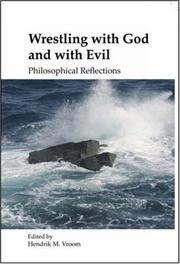
ISBN: 9401204012 1429480920 9781429480925 9042021551 9789042021556 9789401204019 9042021551 9789042021556 Year: 2007 Publisher: Amsterdam ; New York : Rodopi,
Abstract | Keywords | Export | Availability | Bookmark
 Loading...
Loading...Choose an application
- Reference Manager
- EndNote
- RefWorks (Direct export to RefWorks)
The fact of evil continues to raises questions – questions about the relationship between God and evil but also questions about human involvement in it. At the beginning of the twenty-first century, it is now time to see the existence of evil not just as a problem for belief in God; it is a problem for belief in humanity itself as well. For human involvement in evil is not simply a matter of coping with evil but also concerns the fact that humans themselves often seem to do wrong and evil inevitably. Human finitude, ignorance and the unforeseeable consequences of good intentions as well as of neglect can often lead to tragedy. This volume contains contributions from an equal number of male and female scholars in Western Europe and America. It contains discussions of thinkers like Kant, Kierkegaard, Barth, Weil, Levinas, Naber, Caputo and Johnson. It deals with issues like tragedy, finitude, critiques of Western culture, violence and God, and the question of whether theodicies are needed or are even honest. This volume offers an interesting survey of ‘wrestling with God and evil’ from a variety of perspectives in the philosophy of religion on both sides of the Atlantic.
Theodicy. --- Good and evil --- Evil, Problem of (Theology) --- God --- Permissive will of God --- Problem of evil (Theology) --- Religious aspects. --- Permissive will --- Will, Permissive
Book
ISBN: 019189639X 019260967X 0198864221 0192609661 Year: 2021 Publisher: Oxford : Oxford University Press,
Abstract | Keywords | Export | Availability | Bookmark
 Loading...
Loading...Choose an application
- Reference Manager
- EndNote
- RefWorks (Direct export to RefWorks)
'Non-Identity Theodicy' is as an original response to the problem of evil. It constructs an ethical framework for theodicy by sketching four cases of human action where horrendous evils are either caused, permitted, or risked, either for pure benefit or for harm avoidance.
Theodicy --- Good and evil --- Religious aspects --- Evil, Problem of (Theology) --- God --- Permissive will of God --- Problem of evil (Theology) --- Permissive will --- Will, Permissive --- Theodicy. --- Religious aspects.
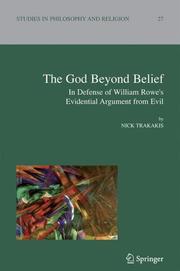
ISBN: 1280656948 9786610656943 140205145X 1402051441 9781402051449 Year: 2007 Publisher: Dordrecht : Springer,
Abstract | Keywords | Export | Availability | Bookmark
 Loading...
Loading...Choose an application
- Reference Manager
- EndNote
- RefWorks (Direct export to RefWorks)
Why would a loving God who is all-powerful and all-knowing create a world like ours which is marred by all manner of evil, suffering and injustice? This question has come to be known as ‘the problem of evil’ and has troubled both ordinary folk and specialist philosophers and theologians for centuries, with no answer seemingly in sight. However, in a series of publications from the late 1970s onwards, Professor William Rowe – one of the leading philosophers of religion today – has put forward a powerful case in support of the view that the horrors littering our planet constitute strong evidence against the existence of God. In this book, the first extended study of Rowe’s defense of atheism on the basis of evil, Nick Trakakis comprehensively assesses the large body of literature that has developed in response to Rowe’s work, paying particular attention to two strategies employed by critics: firstly, the appeal to mystery – the idea that God may well have reasons for permitting evil that lie beyond our comprehension; and secondly, the appeal to theodicies, where this involves offering explanations as to why God allows evil to abound in his creation (free will theodicies, for example, argue that God could not prevent us from acting wrongly without at the same time curtailing or removing our free will). Trakakis unearths significant difficulties in both strategies, and concludes that – absent any evidence in support of theism – the God of theism must be judged to be "beyond belief".
Good and evil --- God --- Theodicy. --- Religious aspects. --- Attributes. --- Rowe, William L., --- Evil, Problem of (Theology) --- Permissive will of God --- Problem of evil (Theology) --- Attributes of God --- Permissive will --- Will, Permissive --- Theodicy --- Attributes --- Religious aspects
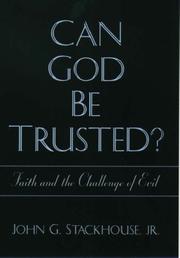
ISBN: 1280529636 019802777X 1429400188 9780198027775 9781429400183 9780195117271 0195117271 9786610529636 6610529639 0190283513 0197738478 Year: 2023 Publisher: New York ; Oxford University Press,
Abstract | Keywords | Export | Availability | Bookmark
 Loading...
Loading...Choose an application
- Reference Manager
- EndNote
- RefWorks (Direct export to RefWorks)
Why does an all-powerful, all-good God allow evil to happen? Offering an overview of this seemingly intractable problem, this text presents the reflections of classical and contemporary thinkers, and gives clues as to how God governs the cosmos.
Theodicy. --- Good and evil. --- Trust in God --- Evil --- Wickedness --- Ethics --- Philosophy --- Polarity --- Religious thought --- Evil, Problem of (Theology) --- God --- Permissive will of God --- Problem of evil (Theology) --- Good and evil --- Christianity. --- Permissive will --- Will, Permissive --- Theodicy --- Christianity
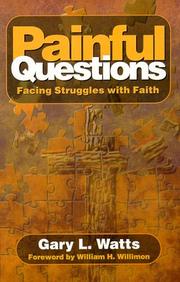
ISBN: 0585262039 9780585262031 0836191218 Year: 1999 Publisher: Scottdale, Pa. Herald Press
Abstract | Keywords | Export | Availability | Bookmark
 Loading...
Loading...Choose an application
- Reference Manager
- EndNote
- RefWorks (Direct export to RefWorks)
Suffering --- Good and evil. --- Theodicy. --- Christianity --- Religion --- Philosophy & Religion --- Evil, Problem of (Theology) --- God --- Permissive will of God --- Problem of evil (Theology) --- Good and evil --- Evil --- Wickedness --- Ethics --- Philosophy --- Polarity --- Religious thought --- Religious aspects --- Christianity. --- Permissive will --- Will, Permissive
Book
ISBN: 1626160112 9781626160118 9781626160101 1626160104 Year: 2013 Publisher: Washington, District of Columbia : Georgetown University Press,
Abstract | Keywords | Export | Availability | Bookmark
 Loading...
Loading...Choose an application
- Reference Manager
- EndNote
- RefWorks (Direct export to RefWorks)
The idea of moral evil has always held a special place in philosophy and theology because the existence of evil has implications for the dignity of the human and the limits of human action. Andrew M. Flescher proposes four interpretations of evil, drawing on philosophical and theological sources and using them to trace through history the moral traditions that are associated with them. The first model, evil as the presence of badness, offers a traditional dualistic model represented by Manicheanism. The second, evil leading to goodness through suffering, presents a theological interpretation k
Theodicy. --- Good and evil --- Good and evil. --- Evil, Problem of (Theology) --- God --- Permissive will of God --- Problem of evil (Theology) --- Evil --- Wickedness --- Ethics --- Philosophy --- Polarity --- Religious thought --- Religious aspects --- Christianity. --- Permissive will --- Will, Permissive --- Natural theology --- Christian moral theology
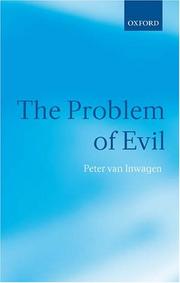
ISBN: 9780199245604 0199245606 0199543976 019171531X 9786610904709 1280904704 1435622421 0191529729 9786611515256 1281515256 0191562521 9780191529726 9780199543977 Year: 2006 Publisher: Oxford Clarendon
Abstract | Keywords | Export | Availability | Bookmark
 Loading...
Loading...Choose an application
- Reference Manager
- EndNote
- RefWorks (Direct export to RefWorks)
The vast amount of suffering in the world is often held as a particularly powerful reason to deny that God exists. Highly accessible and carefully argued, Peter van Inwagen's book maintains that such reasoning does not hold, and that suffering should not undermine belief in God. - ;It is generally supposed that the fact that the world contains a vast amount of suffering, much of it truly horrible suffering, confronts those who believe in an all-powerful and benevolent Creator with a serious problem: to explain why such a Creator would permit this. Many reflective people are convinced that the
General ethics --- God -- Proof. --- Good and evil -- Religious aspects -- Christianity. --- Good and evil. --- Theodicy. --- Ethics --- Christianity --- Religion --- Philosophy --- Philosophy & Religion --- God --- Good and evil --- Theodicy --- Proof --- Religious aspects --- Evil, Problem of (Theology) --- Permissive will of God --- Problem of evil (Theology) --- Evil --- Wickedness --- Polarity --- Religious thought --- Religious aspects&delete& --- Permissive will --- Will, Permissive --- Proof. --- Christianity.
| Listing 1 - 10 of 25 | << page >> |
Sort by
|

 Search
Search Feedback
Feedback About
About Help
Help News
News